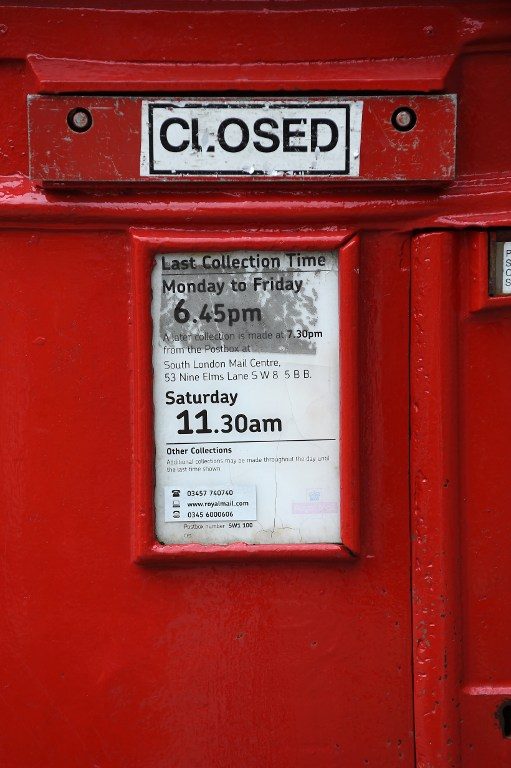SUMMARY
This is AI generated summarization, which may have errors. For context, always refer to the full article.

LONDON, United Kingdom – Britain’s newly elected government announced plans Thursday, June 4, to sell off its remaining stake in Royal Mail and slash ministry budgets in a bid to cut £4.5 billion ($6.9 billion, 6.1 billion euros) from state debt this year.
Less than a month after Prime Minister David Cameron was re-elected at the head of a Conservative government, his finance minister George Osborne said they would waste no time in pursuing their goal of balancing the books.
The sale of the government’s 30% stake in the Royal Mail postal service is expected to earn the state about £1.5 billion, the Treasury said in a statement.
A further £3 billion of savings have been identified for this year in government departments, including £500 million from the defence budget.
This is the equivalent of about three percent of spending, excluding the protected budgets for health, schools and foreign aid, officials said.
Unveiling the plans in the House of Commons, chancellor of the exchequer Osborne said it showed ministers were “getting on with what we promised.”
“When it comes to living within your means, the sooner you start the smoother the ride,” he said.
The Conservatives have promised to reduce departmental spending by £13 billion as they seek to eradicate the deficit by the 2018-19 financial year.
They have also vowed to cut £12 billion from the welfare budget, but have not said how this will be achieved.
Value for money
The previous Conservative-Liberal Democrat coalition government had already slashed government spending by billions of pounds in a bid to cut a deficit that ballooned following the 2008 financial crisis.
But the deficit remains stubbornly high, at 5.2 percent of GDP in the 2014-2015 fiscal year. This is well above the EU limit of three percent, and earned Britain a slap on the wrist from the European Commission last month.
Britain’s debt meanwhile currently stands at almost 90 percent of gross domestic product (GDP), according to the Maastricht criteria comparable with other EU countries.
In 2013, the government sold off more than half of the Royal Mail in an initial public offering that drew severe criticism for failing to achieve value for money.
The company was floated at 330 pence per share but on the first day of trading, shares closed at 455 pence. At the close of markets on Thursday the price was 500 pence.
“That business is now thriving after we gave it access to investment from the private sector in the last parliament,” Osborne told lawmakers.
“There is no reason we should continue to hold a minority stake.”
He added: “We will only sell our stake when we can be sure we’re getting value for money.
“But let’s be clear: holding over £1 billion of Royal Mail shares in public hands is not a sensible use of taxpayers’ money.”
He also announced the government would sell off assets that it “doesn’t need to keep,” including land around King’s Cross station in London valued at £345 million.
Gemma Tetlow, an analyst with the Institute for Fiscal Studies, cast doubt on the impact of the measures.
With asset sales, Osborne was “essentially just trading shares for cash, so that doesn’t really change the overall financial viability of the government,” she told the BBC. – Rappler.com
Add a comment
How does this make you feel?
There are no comments yet. Add your comment to start the conversation.